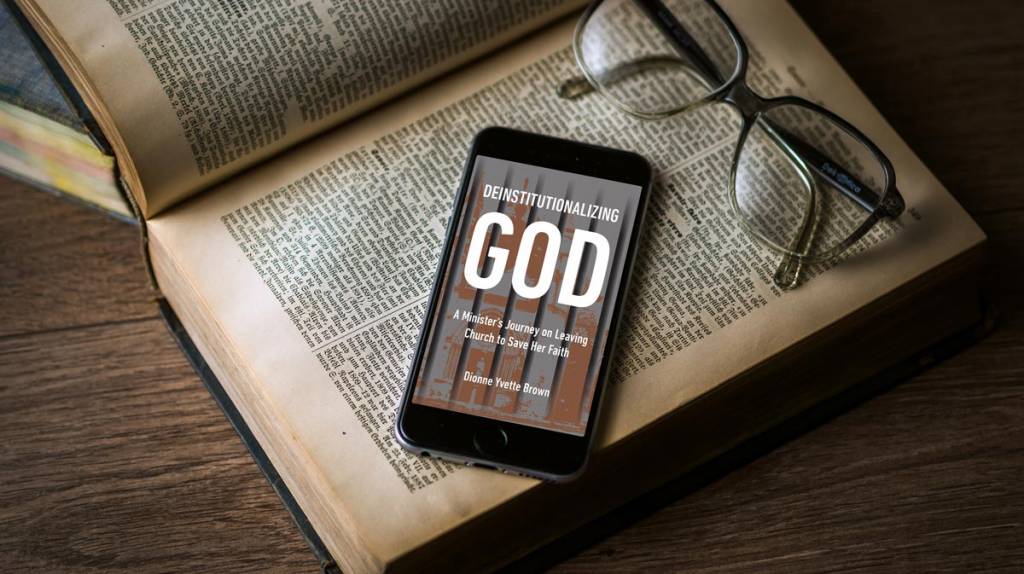
This book was born out of my religious practice in the institutional church. It was either give expression to my reflections on faith or go insane. Literally. I was actually halfway there when I realized the church had beaten me to the crazy house. So here I am struggling with my conflicting experiences.
It is part spiritual memoir, part manifesto on the organized church, born of frustration with the inconsistencies between its witness and the reality of its impact. I wrote this book having just sent a formal letter withdrawing my membership from the congregation with which I had been affiliated for twelve years after being rejected for ordination. The separation was bittersweet as this was the place where my faith was restored after an acrimonious parting with my previous congregation and denomination.
 Leaving church was not an option for me in the early stages of faith. I was raised to believe good, respectable people went to church every Sunday. Ironically, doing so did not bring out the best in me nor did it expose me to the highest inclinations of humanity. Church-hopping was generally frowned upon. You could visit other churches, but your name remained on the same roll and you passed that standing down to your children. I had planned to be funeralized at the same church I attended as a child. Is this the legacy Jesus left?
Leaving church was not an option for me in the early stages of faith. I was raised to believe good, respectable people went to church every Sunday. Ironically, doing so did not bring out the best in me nor did it expose me to the highest inclinations of humanity. Church-hopping was generally frowned upon. You could visit other churches, but your name remained on the same roll and you passed that standing down to your children. I had planned to be funeralized at the same church I attended as a child. Is this the legacy Jesus left?
Stability was a virtue in my community of origin, for better and for worse. Divorce was not common, families seldom moved, and people retired from the same job after 30 to 40 soul-sucking years.
Writing this book was difficult. We do not talk about very personal issues in polite company and not much at all for that matter in my hometown of Washington, DC. There were so many conversations I was afraid of having with myself, let alone penning a narrative account for all who cared to read. I initially tried to conceal my story in abstract philosophical and theological ramblings so the limited audience could keep my confidence. The more I tried to write that way, the less I had to say.
This book was written for the victims of spiritual trauma who have been silenced, the prophetic voices that have been marginalized, and those with eyes to see who refuse to walk in darkness. Wherever you are, there are other deinstitutionalized believers who are willing to walk with you in faith. God cannot be mocked! All manner of religious foolishness will be called out for what it is and cast into the fire.
Maya Angelou said, “there is no greater agony than bearing an untold story inside you.” Lots of people experiencing homelessness are on corners all over the world with masterpieces in their heads and great stories to tell. They are babbling, but no one is scribing their accounts. I was close to being one and wrote this book to release what was driving me crazy.
Staying out of a straightjacket has been my mission. It was either remain in the church, live a lie, and go crazy or be true to who I am in the kingdom and let the chips fall where they may. I could not complete this project until I fully integrated myself—intellectually, spiritually, and professionally. Now that I have, I can get on with the rest of my life and stop being defined by the experience of having been oppressed.
I am neither the first nor the last to recognize the contradictions in the church and try to find my place in spite of them. By the grace of God, I was enrolled in a seminar focused on one of the church’s harshest critics—Danish theologian Søren Kierkegaard—as my own struggle reached crisis proportions. The Dane’s writings saved my sanity. Hopefully mine will return the favor and help others to keep the faith.
The fact that I failed to attain something I restructured my entire life around was a source of shame. The reasons behind it were not my disgrace to bear. Then it came to me from every person I informed of this project that my story must be told and written plainly as the Lord instructed the prophet Habakkuk.
I tried to put the events behind me, but the memories lingered. They were impossible to purge despite my best efforts. Once I decided to unleash the secrets packed away so well in my inner life, a healing occurred that had been long elusive. Although wounds heal, the scars remain. Like Jesus Christ, I have taken the radical step of baring my scars to demonstrate the power of God.
Now in the throes of midlife, I had lived in more places, held more jobs, and belonged to more congregations than my parents have in their combined lifetimes. My only saving grace is that I do not have any failed marriages under my belt. That is not because I am so good at establishing and maintaining relationships. Au contraire! I have never been betrothed.
Leaving church is like the dissolution of a marriage. There is enough blame to go around and the parties are not as cordial as they pretend to be. I do not know whether I will ever join another congregation. The next leg of my journey is devoted to navigating my relationship with the divine without artificial constraints. I will leave the rest up to providence.
